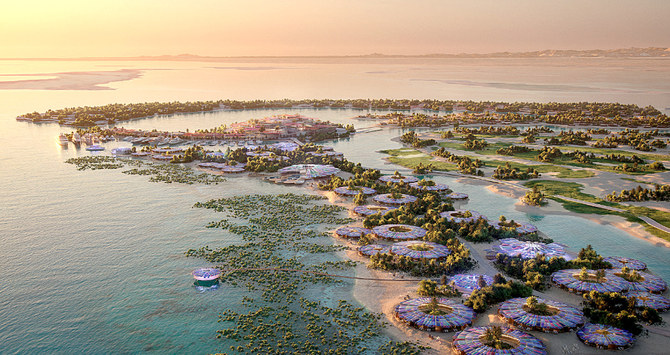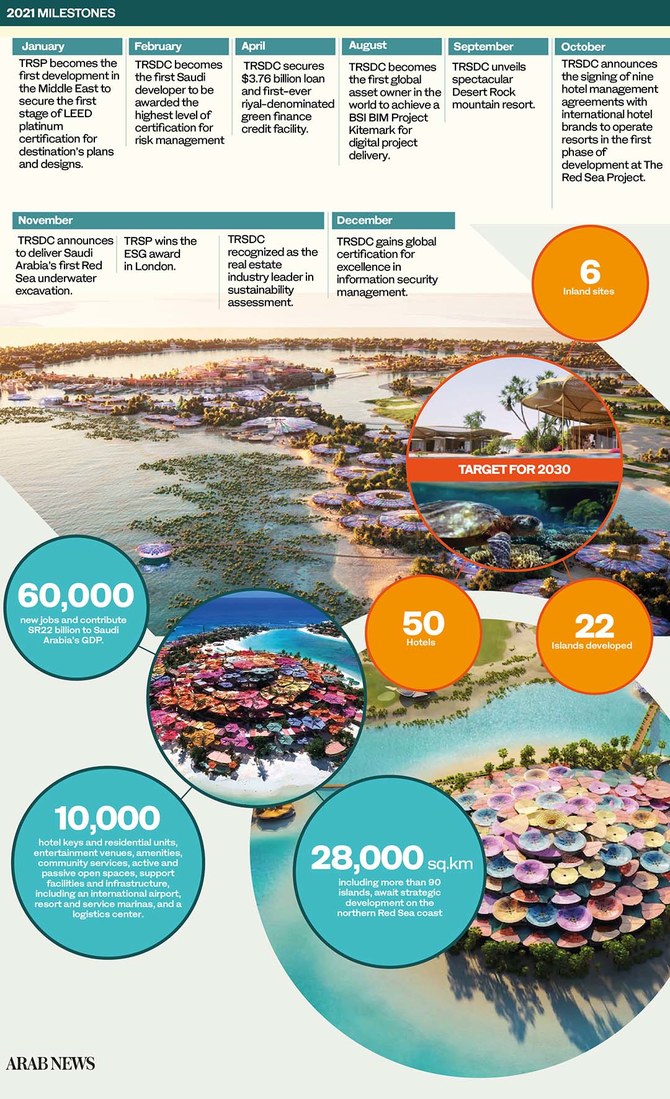RIYADH: The Red Sea Development Co., known as TRSDC, made great strides in 2021 in its mission to build the world’s largest tourism spot powered by renewable energy on Saudi Arabia’s west coast.
The Kingdom’s Public Investment Fund-owned TRSDC was established in 2018 to drive the development of The Red Sea Project, known as TRSP. It is one of the key large-scale giga-projects announced by Crown Prince Mohammed bin Salman the year before.
Last month, a Saudi ACWA Power-led consortium secured $1.33 billion of financing to operate the renewable power-based multi-utilities infrastructure that will serve the site.
The multibillion-dollar project, based between the cities of Umluj and Al Wajh, covers 28,000 square kilometers — an area the size of Belgium — which includes over 90 untouched islands, miles of desert dunes and mountain landscapes.

Alignment to Vision 2030
TRSP, as part of the Kingdom’s giga-projects, falls in line with its Vision 2030 roadmap that aims to diversify the economy and reduce reliance on oil. The plan seeks to boost tourism revenue from its current 3 percent to 10 percent of gross domestic product when it is completed in eight years.
A growing public sector infrastructure also means new opportunities for local citizens. The company is set to create a significant number of jobs, aiming to employ around 60,000 people directly and a further 60,000 indirectly.
This will contribute toward the Kingdom’s plans to boost the Saudi job rate, and lift women’s participation in the workforce from 22 percent to 30 percent by 2030.
TRSDC also partnered with the government’s Human Resources Development Fund last August to deliver high-quality vocational local training programs.
The move follows a series of previous steps taken by the company to lift local opportunities, such as a program to prepare 500 young Saudis for careers to support the eco-tourism complex.
Besides shaping diverse professional development opportunities, TRSDC also expands social and economic opportunities for local communities such as advancements in agriculture through a partnership with social investment company Ethmar and charitable foundation Ghoroos, the company told Arab News.

TRSDC has a huge program to protect the sea turtles in the area where it builds the project. This turtle is now becoming an iconic figure for TRSDC.
Contribution to Saudi economy
The Red Sea project is expected to contribute as much as SR22 billion ($5.9 billion) to the Kingdom’s gross domestic product once completed.
It also aims to attract 1 million tourists a year, without compromising the region’s natural resources.
Environmental, Social, and Governance achievements
The Red Sea Development Co. has achieved an overall score of 91 out of 100 in this year’s environmental, social, and governance assessment by the Global Real Estate Sustainability Benchmark, beating the score of 84 it accomplished in its first-ever assessment last year.
This puts the company in the top 20 percent of organizations participating in this year’s assessment.
In November 2021, the company was given the ESG Initiative of the Year award at The Chartered Governance Institute UK & Ireland’s 2021 Awards.
This followed TRSDC’s launch of its Good Governance Toolkit a month earlier to guide other organizations in Saudi Arabia on best governance practices.
The company plans to hit a net positive conservation benefit of 30 percent by 2040 "by enhancing key habitats of coral, mangroves and seagrasses to allow biodiversity to flourish and to provide safe havens for rare species such as green and hawksbill turtles, sooty falcons,” it said.
Opinion
This section contains relevant reference points, placed in (Opinion field)
TRSP timeline
The final quarter of 2023 will see the completion of the project’s first phase, which includes the building of 16 hotels with 3,000 rooms across five islands and two inland sites. This milestone will also see the development of air, land, and sea transport hubs.
Recently, the company announced the signing of a deal to operate nine hotels that are set to open in the first phase, with five of them opening in 2022.
The plan will see the site host a luxury marina, an 18-hole golf course, leisure facilities, and an international airport that is expected to serve up to one million passengers by 2030. The hub was officially registered with the International Air Transport Association in December.
Once complete, TRSP will feature as many as 50 hotels with 8,000 hotel rooms and 1,300 residential properties across 22 islands and six inland sites.
The developer of the project has so far handed out over 800 contracts worth over SR18 billion up to November.
What’s ahead in 2022?
Apart from welcoming its first visitors in the last quarter of next year, the Red Sea Development Company aims to raise as much as SR10 billion in green financing for Amaala — another luxury tourism site being developed along the northwestern Red Sea coastline — which was recently merged with the company.
Amid the uncertainty produced by the pandemic, TRSDC has performed strongly, marking significant milestones as it moves toward driving the Kingdom’s tourism sector to new heights.

















